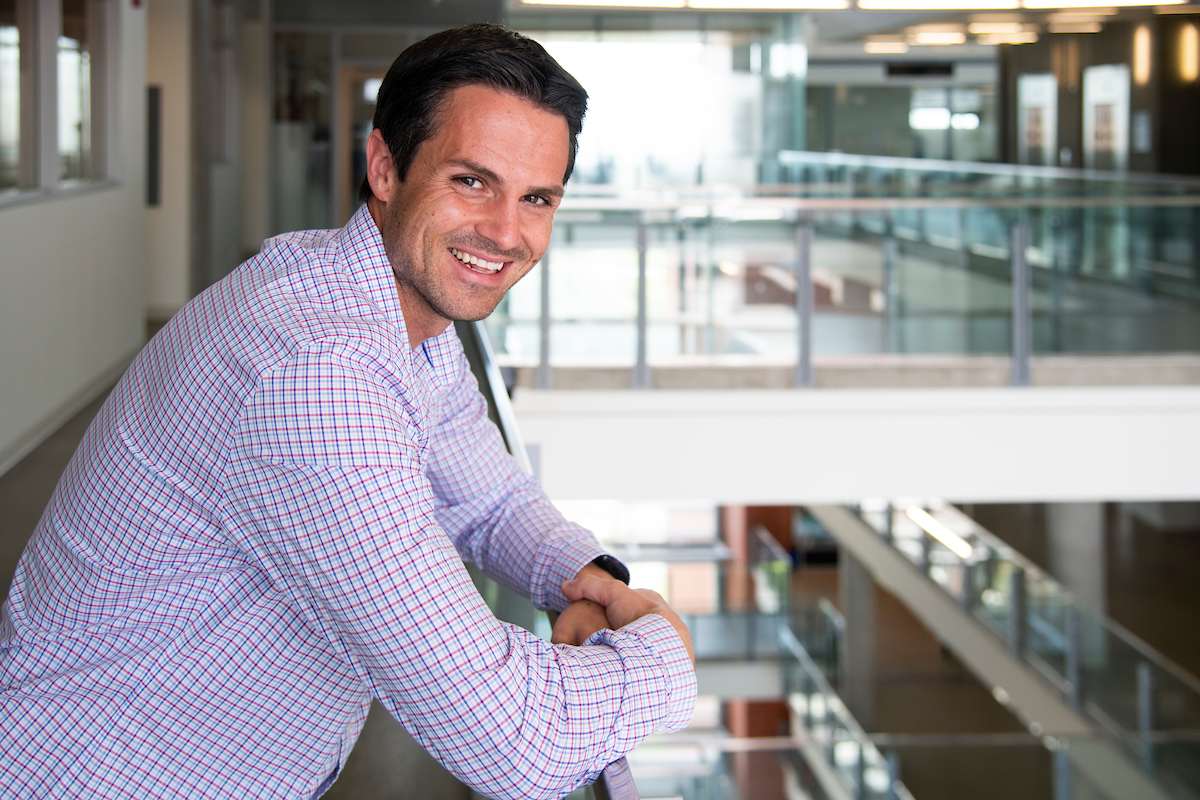
Casey Fowler is a new assistant professor in the Department of Biological Sciences, focusing on bacteria and bacterial pathogens. Photo credit: John Ulan
From drug delivery to environmental clean-up, the potential of bacteria and bacterial by-products is virtually limitless, according to Casey Fowler, a new assistant professor in the Department of Biological Sciences.
Fowler's research examines bacteria and bacterial pathogens in both humans and animals.
Fowler completed his PhD at McMaster University in Ontario followed by a postdoctoral fellowship at the Yale University School of Medicine before coming to the University of Alberta.
What brought you to the University of Alberta?
The University of Alberta is a world-class research institution, and its undergraduate and graduate programs have a phenomenal reputation as well. There is certainly no shortage of intelligent and motivated people working, training, or learning in just about any discipline you can imagine. Having such great access to facilities and talented trainees is going to be really important for the development of my research program here.
On a personal level, as a Canadian who moved out of the country for several years for post-doctoral training, it's exciting to be back. Edmonton has a great laidback and friendly vibe that my family and I love-not to mention an abundance of outdoor hockey rinks!
Tell us about your research program.
My research is focused on understanding the biology of bacterial pathogens. A big emphasis is on understanding how genetically similar bacteria (or bacteria that might be the same species or subspecies) can behave very differently and cause very different diseases. We are particularly interested in genes that, when acquired, lost, or mutated, can have a big influence on the way in which bacteria interact with their hosts.
Ultimately, we hope to exploit the knowledge we gain about the factors that influence the behaviours and virulence of bacterial pathogens in a number of ways. This includes identifying new approaches to combat infections as well as developing new clinical diagnostics that provide a more complete description of the isolated pathogen and its relevant traits. Also, because many of the virulence factors my lab is interested in have evolved to be very efficient at manipulating human biology, they have the potential to be used as tools to combat human disease or to study human biology.
What inspired you to enter this field?
I sort of stumbled into this field accidentally. I did my PhD in a lab that does a lot of cool stuff related to synthetic biology and creating synthetic tools to address biological problems. Because I wanted to do some work in bacteria, I ended up being co-supervised by one of Canada's premier microbiologists. As my career has progressed, I have been drawn more into the microbiology side of things. But my synthetic biology roots will always be with me. I love the creativity involved in trying to develop something new, and I think I will always look for ways to incorporate that into my research.
Tell us about your teaching.
When I was an undergraduate student, I really liked science but I had no idea where I wanted to go with it. A few really great classes and professors stand out in my mind as helping to shape my interests and inspire me to go into research. I suppose my goal as a teacher will always be to try to have this type of influence on my students. Research isn't for everyone, but I at least want to convey the exciting things that are happening in the field and how they relate to everyday life.
I really do believe that microbiology, and bacteriology specifically, will be an incredibly important and rewarding field of research moving forward. Bacterial pathogens are an enormous burden on human health and agriculture, and the antibiotic resistance crisis is not going away any time soon. We need fresh solutions to attack this problem. We are only just beginning to explore the microbiome and its effect on human and animal health. Bacteria are incredibly efficient, and our planet has an almost endless diversity of different species with different capabilities; there are limitless options for how bacteria and their products can be exploited for everything from drug delivery to environmental clean-up. If I can get students genuinely excited about some of these issues, I'll feel like I'm doing my job.
Anything else you'd like to add?
Come join my lab! If you're an undergraduate student here or if you are thinking about graduate studies and my research sounds interesting, I'd love to hear from you. Email for more information.